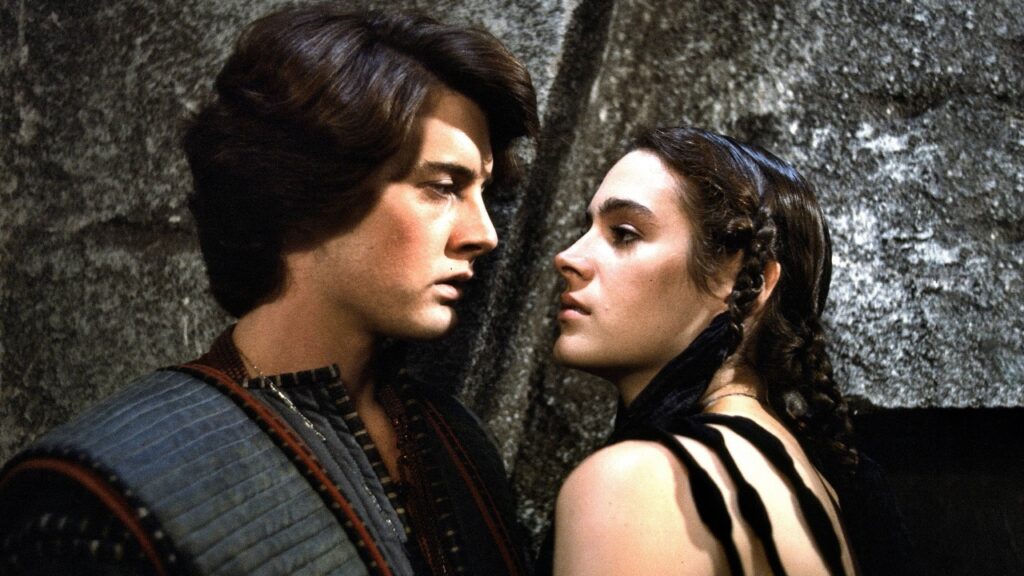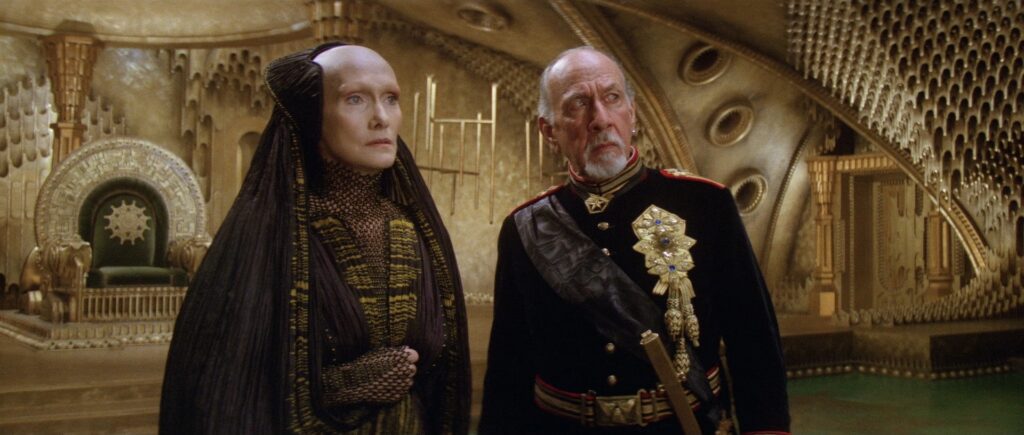Is David Lynch’s Dune an incomprehensible mess, a misunderstood masterpiece or somewhere in between? In setting out to adapt Frank Herbert’s seminal 1965 novel for the screen, Lynch ventured where few other filmmakers dared to tread—with decidedly mixed results.
We begin with a woman’s face projected against a field of stars. She is Princess Irulan (Virginia Madsen) and she explains to us that in the far future, the most valuable commodity in the universe is the spice mélange: a compound which extends the human lifespan and opens up the mind and senses, enabling the Spacing Guild to facilitate faster than light travel between planets. The spice can only be found on one planet, Arrakis (colloquially known as Dune), inhabited by the mysterious Fremen. Irulan’s monologue is followed by a secret Spacing Guild message outlining the feud between two noble houses—House Atreides of Caladan and House Harkonnen of Giedi Prime—which will soon threaten spice production. A Guild Navigator is dispatched to the Padishah Emperor Shaddam IV (José Ferrer), ruler of the known universe and, incidentally, Irulan’s father, to demand that he deal with the situation, including eliminating a new threat: Duke Leto Atreides’ (Jürgen Prochnow) only son and heir, Paul (Kyle MacLachlan).
And here we find the first of the film’s many problems. Not one, not two, but three prologues are piled on top of each other. And another immediately follows as we first meet Paul, consulting an encyclopaedia entry on Arrakis. Herbert’s novel is intricate and dense. That’s part of its beauty. Lynch, who not only directed the film but also wrote its screenplay, has so much exposition to present that the only way to bring the audience up to speed is burying us under an avalanche of information before we’ve found our footing.
But back to the plot. The Emperor has given House Atreides the immense honour of displacing the Harkonnens as rulers of Arrakis. Duke Leto suspects this is a poisoned chalice but has no choice but to obey. Meanwhile, the Bene Gesserit—a sisterhood whose members are trained to have superior physical and mental abilities—have spent generations selectively breeding humans with the aim of producing the Kwitsatz Haderach, a superhuman being they intend to control and present as a messiah. Lady Jessica (Francesca Annis), Duke Leto’s concubine, is a Bene Gesserit and was ordered to bear him a daughter. Instead she chose to have a son, Paul, who may or may not be the long-awaited messiah. As House Atriedes struggles to establish itself on Arrakis, different factions vie for supremacy. Only one thing remains constant: the spice must flow.
Like the old quip about Robert Browning’s translation of a Greek poem, the original Dune is of great help in elucidating Lynch’s version. When I first watched the film I was lucky enough to have a guide who explained things when I got lost—which was once every 10 or 15 minutes. After I’d read the book I revisited the film and was impressed by just how much Lynch had managed to cram onscreen.
But a successful adaptation should be able to stand on its own, not rely on familiarity with its source material. Princess Irulan is barely seen but often heard, doling out narration. This is in keeping with the novel, where most chapters begin with an excerpt from a book she has written about Paul, though we don’t work out why she’s so interested in him until almost the final pages. The film is also overflowing with internal monologues—all performed in a register just above a whisper, as if characters are afraid of being overheard in their own minds.
There is simultaneously too much and too little happening on screen. Take Chani (Sean Young). She appears in Paul’s dreams before he even arrives on Arrakis, a mysterious woman who proves crucial to his future. They meet and fall in love. But who is she? What are her likes and dislikes? Does Paul fall in love with her because he’s seen her before and already drawn to her? If so, what does she see in him? The best the film can offer is Irulan’s voiceover informing us that their love grew.
To be fair to Lynch, much of the blame lies with the studio, who demanded a conventional two-hour cut of a decidedly unconventional, sprawling epic.
It may seem strange, then, to complain that a film so overstuffed is missing something. Dune was published three years after the release of Lawrence of Arabia (1962). Both are set in the desert and feature a charismatic outsider leading an indigenous group in revolt against their oppressors. In Lawrence, several Arab fighters grow to venerate T.E. Lawrence and their adulation helps chip away at his sanity. In Herbert’s Dune, Paul is uneasy with the mantle of being the Fremen’s messiah and the violent fanaticism that comes with it. Lynch doesn’t explore this territory. His version of Paul’s messiah-hood is unequivocally, frustratingly, positive.
Although Dune’s narrative is choppy, the world the characters inhabit is convincingly alien, with just enough touches of the familiar to throw the strangeness into relief. The women of the Imperial court wear Renaissance dresses; House Atreides favours 19th century military uniforms. Duke Leto’s fortress on Caladan feels like a vast ship from the age of sail, full of dark wood paneling. Giedi Prime is a technopunk nightmare choked by pollution. (Bob Ringwood and Anthony Masters created the costumes and production design respectively.) The sandworms have held up well: behemoths with gaping maws who erupt from the sand, dwarfing nearby humans.
Lynch also brings his signature weirdness to Dune, most notably with his interpretation of the Harkonnens. Baron Harkonnen (Kenneth McMillan) is less obese than his novel counterpart, but his face is covered with horrible sores—a doctor is seen draining them of pus. His younger nephew is played by Sting, who at one point appears clad in a Speedo (and nothing else) and poses while the Baron ogles him. Sting has only a handful of scenes. You’ll likely remember them all.
Indeed one of the film’s greatest strengths is its cast. Siân Phillips is deeply unsettling as Reverend Mother Mohiam, a senior Bene Gesserit; her torture of Paul is chilling in its detachment. Patrick Stewart’s Gurney Halleck is a doughty man-at-arms, possessed of such dignity that he never looks absurd, even when rushing into battle while cradling one of the Atreides’ pet pugs. Francesca Annis brings mysticism and heartache to Lady Jessica. And Kyle MacLachlan, making his screen debut, is very good as Paul, a precocious, somewhat sheltered young man who endures a crucible of pain and trauma.
Dune flopped heavily at the box office, which was inevitable considering the extent of Lynch’s ambitions and the studio’s meddling. It has since grown into a cult classic. Subsequent adaptations have adopted its aesthetics—Denis Villeneuve’s recent films show a clear debt to Lynch—and the score, by Brian Eno and Toto, has been much imitated by productions aiming for a far out space sound. Dune is a noble failure best appreciated in the right spirit: with an open mind.



Granted that the task of making a movie out of Herbert’s novel Dune is a daunting one in part because of the density of the storytelling, I agree that once made, the movie ought not to rely upon knowledge of the novel to make complete sense to the viewer.
I was quite impressed with Denis Villeneuve’s version in Dune Part 1, that seemlessly introduces us to the characters, the setting, Fremen, the spice mélange, House Harkonnen, Giedi Prime, House Atreides, Caladan, The Emperor, The Space Guild, etc. This is by contrast much better than Lynch’s original that confusingly and overwhelmingly dumps all this information into the lap of the viewer via a series of prologues right off the bat.
However, the overall storytelling of Dune is ruined for me by changes to the characters and story that I very much dislike specifically in Villeneuve’s Dune Part 2. So much so that even with the advantage of the funding for two movies for the Dune story, the advanced modern special effects and superior cinematography, Lynch’s version (though itself flawed) in my opinion is a better movie of Herbert’s Dune novel. I am sure a couple of the changes in Dune Part 2 were to be able to facilitate a Dune Part 3.
It would be interesting to see a review of the two Vileneuve Dune movies contrasted with Lynch’s movie and the book.
I watched ‘Dune Part 1’ when it first came out and thought it was alright, but haven’t made my way to ‘Dune Part 2’ yet. I’ll try watching them both back to back.